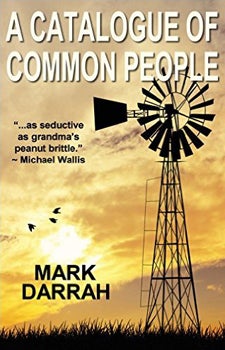A People Person
Growing up in Oklahoma in the late ’60s and early ’70s, Mark Darrah lived in five different towns before graduating from high school in Tahlequah, the capital of the Cherokee Nation. His father, a Methodist minister subject to the directives of a regional bishop, was obliged to move his family around the state on a semi-regular basis.
But perhaps this acclimated Darrah to change and novelty, which facilitated his relocation to USC as a young student in its cinema program. Though he always had a passion for film and the art of storytelling, after a year or so he decided his professional ambitions veered more toward the practical.
Plus, he said, “I realized how much more I needed to learn before I could really tell a story.”
A man for the people
These days Darrah is a lawyer in Tulsa, Oklahoma. The career is somewhat of a tradition in his family, as both his grandfather and great grandfather were lawyers, and he still uses the desk on which the latter practiced law in the early days of Oklahoma statehood.
After getting his J.D. at the University of Oklahoma, Darrah spent a few years doing litigation in Tulsa with two prominent law firms, which proved quite lucrative.
“But then I realized, this isn’t really why I got into practicing law,” he said. “I wanted to represent regular people.”
In 1989, the opportunity arose to go out on his own as a sole practitioner — and he went for it. Since then he has been working as a general civil practice attorney with a focus on estate planning, probate and trust representation. He’s not involved in criminal law, bankruptcy or domestic law.
“In Tulsa, I represent several hundred individuals, small businesses and professional people. I have the closest thing to a small-town practice that one could have in the city.”
TulsaPeople magazine named Darrah one of the city’s top attorneys in 2011 and 2012.
He also spent some time working as an adjunct administrative law judge for the Oklahoma Department of Labor. He liked it well enough, but found he still preferred being an advocate and counselor.
Learning to live a life

Mark Darrah’s book is dedicated to, among others, the “uncommon common people whose stories are told here.”
He recalls his time at USC Dornsife as a very enriching experience, a place where he fully realized just how much there was to learn about the world. In the mid-70s, the interdisciplinary studies program was very new, but with his emerging interest in law, Darrah switched into it, setting aside his cinema studies major.
“There were 15 to 20 mostly tenured faculty members who supported the program, and they were some of the best scholars and teachers in the College,” he said. “I learned so much from being able to spend time with them.”
USC Dornsife was where he learned to live a life, Darrah said.
“I have kept that sense of curiosity I learned there and I’ve maintained it as a lifelong endeavor.”
The same curiosity led Darrah to become a guest commentator for StudioTulsa on Public Radio Tulsa 89.5 FM. Film school or not, he never lost his love for telling stories and has always been a writer, both fiction and nonfiction. In the late ’90s, he began reading some of his stories and short essays on the radio and soon developed a fan base.
Many of these writings became the basis for the recently published A Catalogue of Common People (Roots and Branches, 2015), a collection of his personal essays and commentaries. A few of these essays reference Darrah’s time at USC.
“Monuments” tells of his experience living in a university-owned apartment building as a slightly homesick freshman, where he befriended a few members of the cleaning staff who provided him with an unexpected kindness. In “Jigsaw Puzzles or Sandcastles,” readers meet a unique college roommate, a vivacious, ballroom-dancing Yugoslavian.
“The stories really seem to resonate with people. Friends, clients or acquaintances will often reference one of my stories and then they’ll tell me one of their own.”
Just like Darrah’s late grandfather used to say, “Every person is a book.”